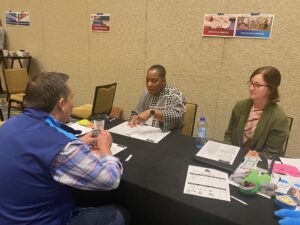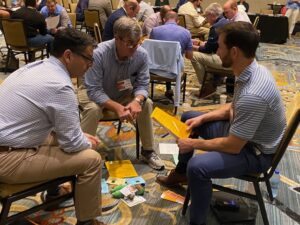We bring the following values to our poverty education programming:
Poverty Awareness includes understanding the facts of how poverty affects people, communities, and systems of care
- One of the best ways to understand poverty is through the perspective of those living in poverty.
- Understanding poverty requires an examination of public data and standpoints toward poverty and their connection to policy, oppression, and discrimination.
- Learning about poverty can occur through volunteering, simulations and other experiential activities.
Poverty Awareness involves empathy and self-reflection.
- Poverty awareness requires individuals to recognize their own attitudes and ideologies relating to people in poverty.
- Poverty awareness includes authentically sharing one’s knowledge and perspective about how to create prosperity for all.
One of our most used poverty education tools is the Community Action Poverty Simulation, which is a unique, interactive experience that helps facilitate understanding of the challenges faced by individuals in our community who are living at or below the poverty level. The simulation increases participants’ understanding of hardships and the emotional toll experienced by impoverished members of our society and the work it takes to achieve self-sufficiency.
This educational and professional development experience was created as a way to help business and community leaders; students, faculty, and administrators; faith-based organizations, nonprofit organizations, and others understand the realities of poverty. During the simulation, participants role-play the lives of families living at or below the poverty level. Participants will experience typical challenges faced by individuals living in the context of constrained financial circumstances including maintaining employment, caring for children or elderly family members, seeking public assistance, and dealing with transportation issues.
The Poverty Simulation was designed to sensitize those who frequently deal with low-income families, as well as to create a broader awareness of the realities of poverty among policy-makers, business and community leaders, students, faculty, administrators, and more. The simulation enables participants to look at poverty from a variety of angles and then to recognize and discuss the potential for change within their community. Social work CEUs will be available, and Alabama Possible can collaborate with other providers to provide continuing education credit for participants.
Logistics
Virtual option is also available.
Who can benefit?
The Poverty Simulation was designed to sensitize those who frequently work with or assist under-resourced families, as well as to create a broader awareness of the realities of poverty among policy-makers, business and community leaders, students, faculty, administrators, and more. The simulation enables participants to look at poverty from a variety of perspectives and then to recognize and discuss the potential for change within their community.
– Students, Faculty, and Administrators
– Business and Community Leaders
– State Agencies
– Nonprofits and Faith-Based Organizations
– Elected Officials
– Professional Development Conferences
Interested in hosting a simulation for your class, workplace, conference, or house of worship?
Contact Manisha Mishra of Alabama Possible at 205.939.1408 or [email protected]

